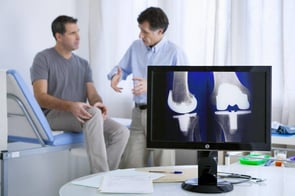 Knee replacement, or arthroplasty, is a very common surgery. More than 600,000 of these procedures are performed every year in the United States, and it is considered one of the most successful and life-enhancing surgical procedures today. However, these results are not seen instantly. Rather, they develop gradually during the weeks and months following joint replacement surgery. If you will be having this procedure, learning what to expect during this time can help make the recovery process easier and less stressful.
Knee replacement, or arthroplasty, is a very common surgery. More than 600,000 of these procedures are performed every year in the United States, and it is considered one of the most successful and life-enhancing surgical procedures today. However, these results are not seen instantly. Rather, they develop gradually during the weeks and months following joint replacement surgery. If you will be having this procedure, learning what to expect during this time can help make the recovery process easier and less stressful.
To get you started, here are 4 important facts to know about recovery from knee replacement surgery:
You'll have pain and swelling for some time after surgery
While most people know that surgery involves pain and swelling, many aren't prepared for the level of pain that they experience after joint replacement surgery or the length of time it can take for these symptoms to resolve. Your knee will likely swell to the size of a grapefruit during the first 1 to 3 weeks after your procedure, and you may have some swelling around your new joint for as long as 6 to 12 months. Expect pain to be quite intense right after surgery, then gradually diminish over the following 3 to 6 months.
You'll be expected to get on your feet quite quickly
You can expect to spend 3 to 5 days in the hospital after knee replacement, and most patients are on the shorter end of that range. Before that short stay is over, you'll have to meet certain recovery benchmarks to ensure that you can be discharged safely—in spite of the above-mentioned pain and swelling. You'll need to be able to use a walker or crutches to get around independently, manage a few stairs, and handle other personal care tasks on your own. You will also need to know how to perform prescribed exercises safely. To help you meet those goals and aid in preventing blood clots and other complications, physical and/or occupational therapy will begin within hours of your surgery.
Good rehabilitation therapy after hospital discharge is essential to optimal recovery
Your healthcare team will recommend continuing with therapy after discharge from the hospital. Following that recommendation is essential to making your best recovery after joint replacement surgery. A comprehensive rehabilitative treatment plan will help you regain strength, flexibility and function in the affected knee and reduce pain and swelling more quickly and completely than you otherwise would and can aid in preventing complications, such as the development of excess scar tissue that inhibits joint function.
Recovery and rehabilitation will be a full-time job
You can expect that, for at least 3 to 6 weeks, your life will be largely consumed by recovery and rehabilitation. There will be medications, therapy and medical appointments to manage and exercises prescribed for you to do between therapy sessions. You'll spend time working to control pain and swelling, and just about everything you normally do will be more difficult and time-consuming. Being prepared for that reality means planning ahead to ensure that you have the help and equipment you need at home—and when you must go out too, since driving will be off-limits for a while. Alternatively, you can choose to spend the first, most difficult days after surgery in an inpatient rehabilitation setting, leaving you with much less to manage, freeing your time and energy for the most important task: getting back in shape and back to your life as quickly as possible.





